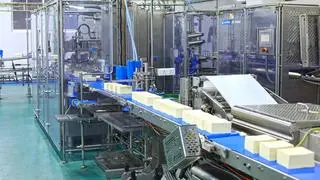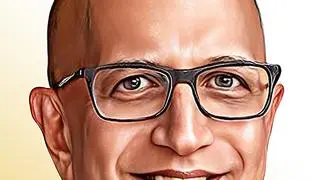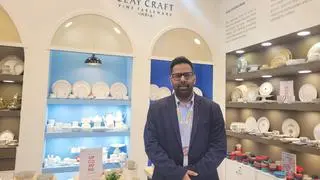Suneeta Reddy leads us from the hush of the well-appointed boardroom at Apollo Hospitals group corporate office to an equally well laid out dining hall. We can eat while we talk, says the Managing Director of India’s most well-known hospital chain. The quietness is a far cry from the heaving, teeming bustle one can see at the hospital’s reception, the first of Apollo’s 70 hospitals, on Chennai’s Greams Road. With a lull in the pandemic, all those requiring healthcare for ailments other than Covid-19 are back in droves.
If it wasn’t for the times we live in, the soft-spoken Suneeta says she would have met us at a restaurant for a conversation; so Raghuvir Srinivasan, Editor, BusinessLine , and I meet her at her office, where she has promised us a good teatime spread. The discussion, of course, kicks off with what’s on top of everybody’s mind: The pandemic.
“The first wave of the pandemic was something that no one had ever seen before. We being in the healthcare sector were familiar with viral borne diseases such as H1N1, MERS, but to take that experience and scale it up to tackle Covid-19 was challenging,” she explains. Infectious diseases specialists and doctors in the Apollo system started collaborating. “The first thing we did was to get the protocols in place; first was isolation facilities and then adequate protection for all those in the chain from doctors to nurses and food service providers who were catering to the Covid-19 patients.
And, Covid-19 was very new for the doctors, unlike anything they had experienced before. Patients who needed treatment which could be postponed, stopped coming, leaving Apollo to focus on Covid-19 care. Apollo developed a programme called kavach , which first isolated patients and those who didn’t have severe infections were allowed to stay in hotel rooms. Then clinical protocols were codified in a red book. “During the first wave everything was new and changing and some of the drugs were also in clinical trials and this red book would update clinical protocols which were shared among the 35 hospitals of Apollo involved in Covid-19 care. In the second wave we even shared best practices with smaller nursing homes,” she explains. During this period, Apollo used 2,500 of the 10,000 beds it has for Covid-19 care with around 17,000 patients in hotel isolation over a period. Its medical director also connected with physicians around the world for the latest information to treat the infection.
A liveried waiter tip-toes up and serves us hot coffee and plies us with various little delights: A multigrain quiche with broccoli, tomato, artichoke and red cheddar and cranberry scones with jam and clotted cream and more scones with a cheesy herb dip. There’s also an open sandwich with avocado, asparagus, bell peppers, with cheese and lettuce. Suneeta had promised an English tea and it’s laid out, all right, though she herself eats little, pointing out that scones are her mother’s favourite evening snack.
The two Covid-19 waves
Still on the pandemic, Suneeta says there was a huge difference between the first and second waves. “In the first we had to open out only 2,500 beds; in the second wave we had to open out 5,000 beds (of the 10,000 beds Apollo has all over) for Covid-19 care, and at least 8,000 hotel rooms and it was still not enough. We did our best. Our principle, as our father (Apollo founder Chairman Dr Prathap C Reddy) said, no patient should be denied care. There was really a lot of pressure,” she recalls. She, and her sisters too, received a barrage of calls, even from ministers, for a bed and the hospitals tried their best to take in all requests. The saddest part of the second wave, she says, was when minutes after reaching a hospital people passed away as the drop in oxygen was so sudden.
Ask her about the talk of a third wave looming, she says, “I think the worst is over, and now we have a medical arsenal and people are better prepared.”
The pandemic saw Apollo take a deeper dive into digital with Apollo 24/7 (now part of Apollo HealthCo Ltd). With five million active users using Apollo’s teleconsult services of its doctors, Suneeta believes a hybrid model could well be here to stay. Its app had 15 million downloads! Suneeta also points out Apollo has 4,100 pharmacies. “Pharmacies are at least 40 minutes away from homes (in delivery zones) in 40 per cent of India. It has marked out 10,000 PIN codes and in terms of delivery it is the only online company which can deliver within two hours with a prescription fulfillment of 85 per cent,” she explains.
The talk veers to the shortage of para-medical staff in the country, which Suneeta says is a real problem. “A lot of our nurses go abroad; they may not have good language skills, but they make up with the compassion and care they give. We should either look at it as an advantage or disadvantage. Unfortunately, the healthcare sector has never been given the impetus to really do something significant that would subsidise what we do here,” she elaborates.
During Covid-19, through an affiliate company, Med Skills, nurses were upskilled to use ventilators as it’s a complicated task and monitoring them cannot be done by untrained nurses. Junior docs were trained to ventilate and junior nurses trained to monitor. “We had it as a digital platform and could quickly execute and upgrade,” she adds.
Different paths
Ask Suneeta how come neither she nor her three sisters studied medicine, she smiles, and says her sister Preetha did secure a seat in a medical college and she was keen, “but dad said no; we just don’t have enough managers and we need people to run the system.” Suneeta herself wanted to go to Harvard for her post-graduate studies but couldn't, though later she did a course for owner-managers at Harvard Business School. Suneeta graduated from Chennai’s well-known Stella Maris College and followed it up with a diploma in financial management from the Institute of Financial Management & Research (now part of Krea University).
Recalling her days of growing up in then Madras, Suneeta says they all came back from the US when Dr Prathap Reddy, a cardiologist, decided to relocate to India. “Within one year of coming back, father was completely upset as he lost a patient who couldn’t go to the US for a heart surgery and he resolved to set up a corporate hospital. Everyone said it was impossible as it needed the equipment, technicians, quality doctors, but few people bought into his vision,” she reminisces.
All the four sisters were a part of the planning for Apollo as “no one fully understood his vision as we did.” AF Ferguson was hired to work on a business plan and an agency was entrusted to come up with an appropriate brand name. “I was 19 then. The agency came up with all kinds of names which we were not happy with. We wanted something with the letter A as I was thinking of stock exchanges where a company with the first letter A would be on top. I came up with Apollo, the Greek god of healing. But, the name is one thing, fulfilling the vision is another and that’s where all the sisters pitched in.”








Comments
Comments have to be in English, and in full sentences. They cannot be abusive or personal. Please abide by our community guidelines for posting your comments.
We have migrated to a new commenting platform. If you are already a registered user of TheHindu Businessline and logged in, you may continue to engage with our articles. If you do not have an account please register and login to post comments. Users can access their older comments by logging into their accounts on Vuukle.